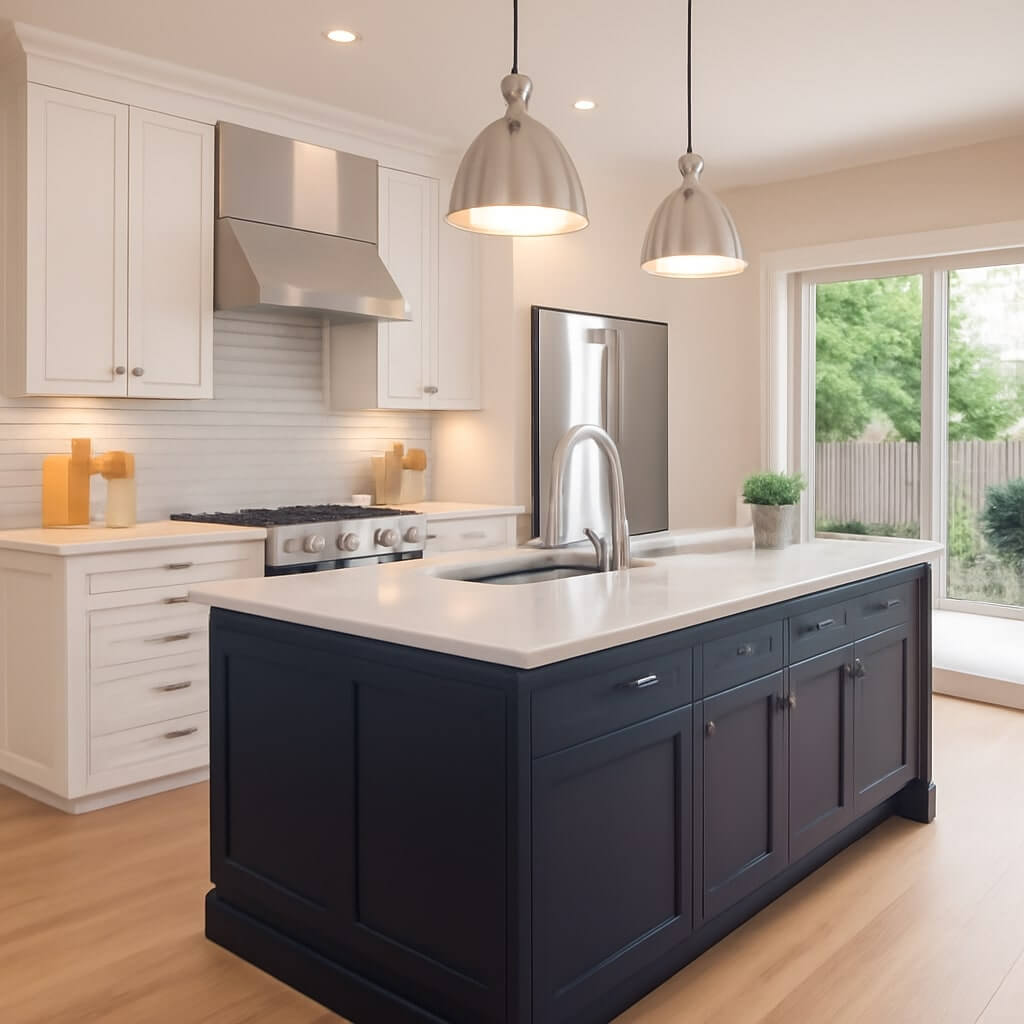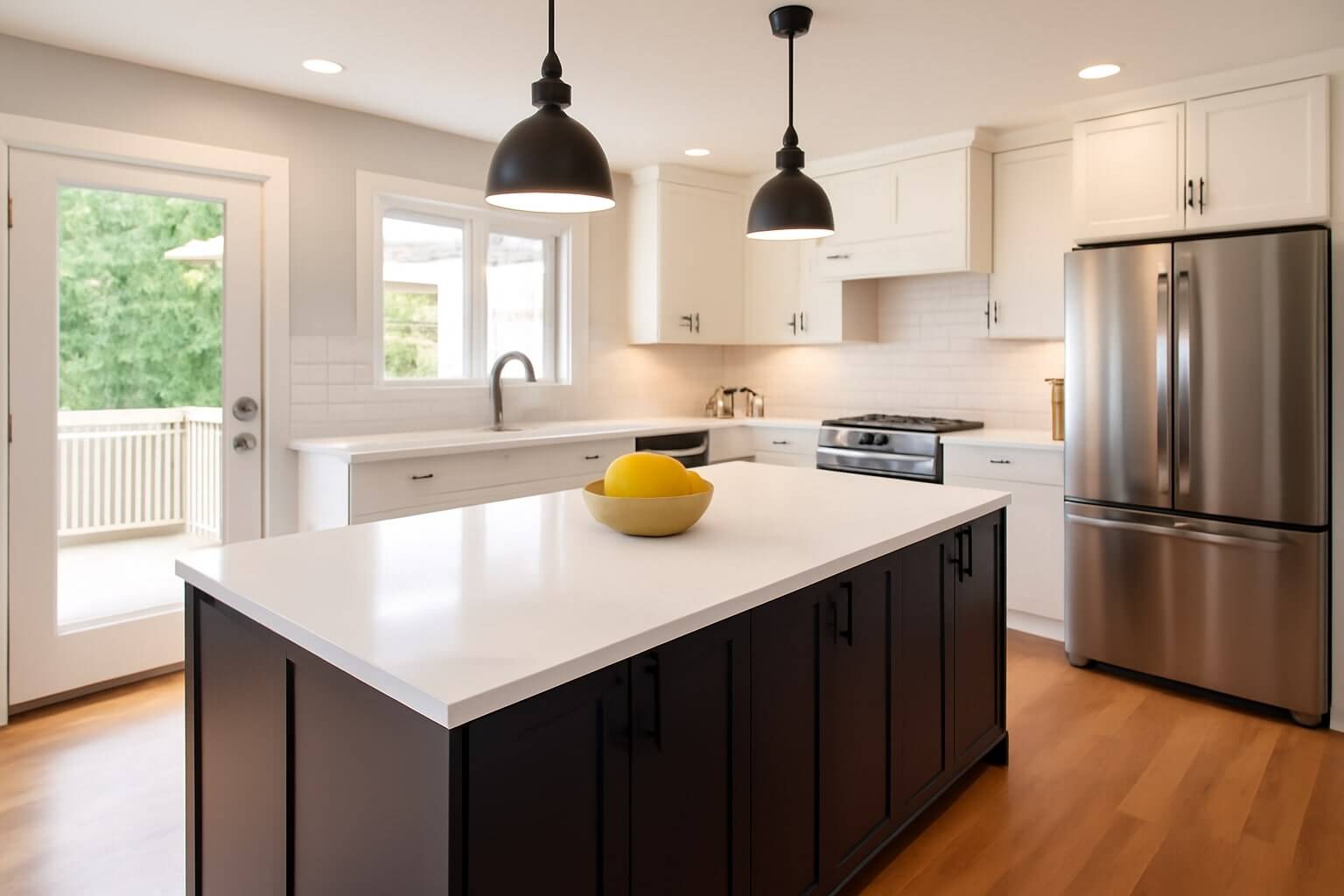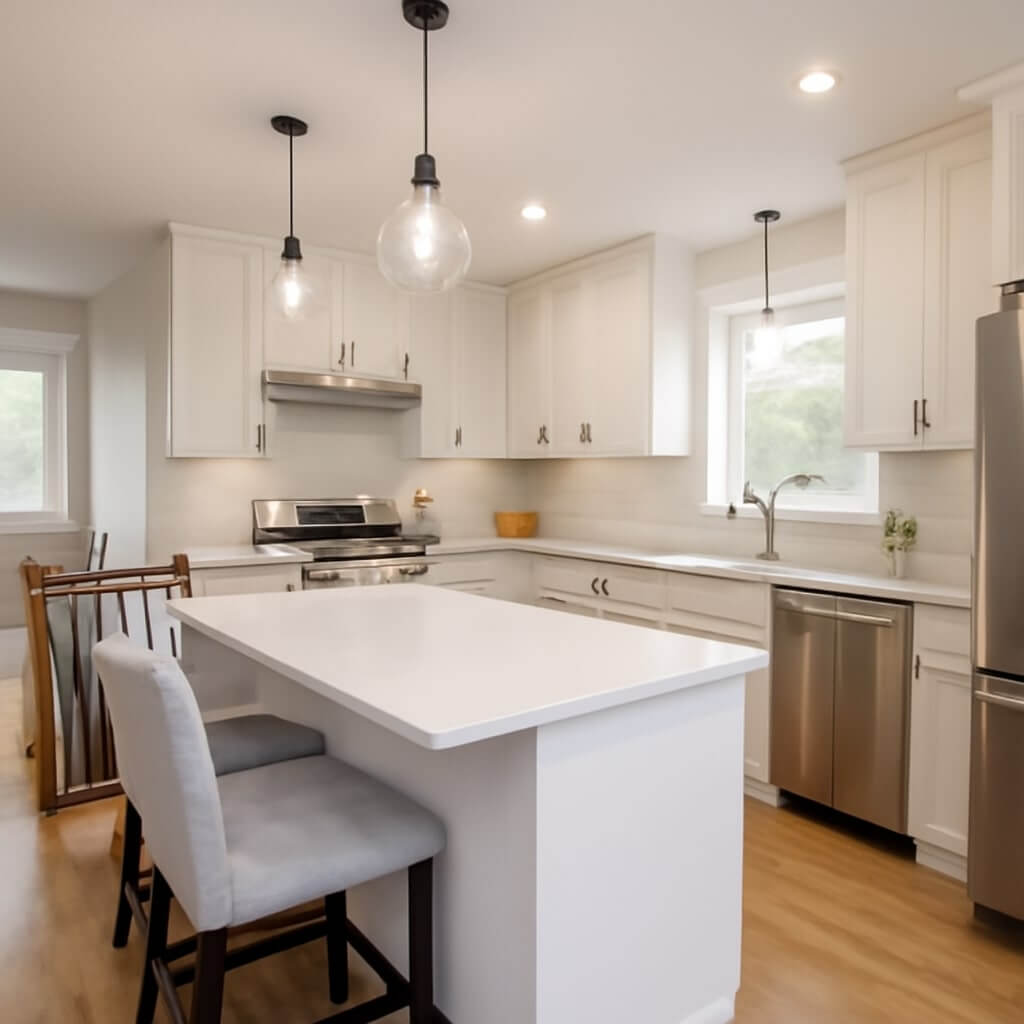When planning a kitchen remodel in the Bay Area, it’s essential to take into account several key factors that can greatly impact your budget. Material selection plays a vital role, as high-quality finishes can elevate both style and durability. Labor costs, often influenced by the expertise required, also contribute to the overall expenditure. Plus, the size and layout of your kitchen, along with any custom upgrades, can further complicate your financial planning. Let’s explore these elements in detail.
Key Takeaways
- Material selection, including high-quality countertops and cabinetry, significantly impacts both aesthetics and costs in a kitchen remodel.
- Labor costs in the Bay Area are high, with skilled trades being essential for quality workmanship and preventing costly mistakes.
- Kitchen size and layout directly influence material and labor expenses, requiring careful planning for functionality and design.
- Custom features and high-end appliances can enhance kitchen appeal but also significantly increase remodeling costs, necessitating budget considerations.
- Understanding local permits and regulations is vital to avoid delays and fines, ensuring compliance with safety and structural standards.
Material Selection and Quality
When you commence a kitchen remodel in the Bay Area, the materials you choose can remarkably impact both the aesthetics and costs of your project.
Selecting the right countertop materials, such as granite, quartz, or laminate, influences not only the look but also the durability and maintenance needs of your kitchen.
Choosing the right countertop materials, like granite or quartz, impacts both the aesthetic appeal and the practicality of your kitchen.
Similarly, your cabinetry options, whether custom, semi-custom, or ready-to-assemble, can considerably affect your budget and design.
Higher-quality materials often come with a steeper price tag, yet they can enhance your kitchen’s value and lifespan.
Weighing your choices carefully guarantees a stunning, functional space that meets your needs and budget.
Labor Costs and Expertise
Though you might focus on materials during a kitchen remodel, labor costs and the expertise of your contractors are equally essential to your project’s success.
The labor market in the Bay Area is competitive, which can lead to higher wages for skilled trades like electricians, plumbers, and carpenters. When hiring, consider not only the costs but also the contractor’s experience and reputation.
A seasoned professional can prevent costly mistakes and guarantee quality workmanship, potentially saving you money in the long run. Investing in skilled labor may seem expensive upfront, but it’s critical for achieving your dream kitchen efficiently and effectively.
Kitchen Size and Layout
The size and layout of your kitchen play an essential role in determining both the scope and cost of your remodel. A well-planned kitchen maximizes functionality while adhering to current design trends.
The kitchen’s size and layout significantly influence your remodel’s cost and functionality.
Consider these factors:
- Square Footage: Larger kitchens typically require more materials and labor, increasing costs.
- Layout Configuration: Open-concept designs may demand structural changes, impacting your budget.
- Work Zones: Effective delineation of cooking, prep, and storage areas enhances kitchen functionality, but may require additional planning and resources.
Custom Features and Upgrades
Custom features and upgrades can greatly enhance both the aesthetic and functionality of your kitchen remodel. Investing in custom cabinetry options allows you to maximize space while reflecting your personal style.
Tailored designs can provide unique storage solutions that standard cabinets can’t match. Additionally, incorporating high-end appliances not only boosts your kitchen’s efficiency but also elevates its overall appeal. Brands like Sub-Zero and Wolf offer cutting-edge technology and sleek designs, making your kitchen a joy to cook in.
Ultimately, these enhancements can considerably influence your remodel costs, so consider your budget carefully when planning these luxurious additions.
Permits and Local Regulations
When planning your kitchen remodel, understanding local permits and regulations can be just as important as choosing custom features.
Understanding local permits and regulations is essential for a successful kitchen remodel, just like selecting custom features.
Ignoring these can lead to costly delays or fines. Here are three key aspects to take into account:
- Permit Applications: You’ll need to submit detailed plans to your local authority, which can take time to approve.
- Zoning Restrictions: Check for limitations that might affect your remodel, such as height or boundary regulations.
- Building Codes: Verify your design complies with safety and structural standards to avoid issues during inspections.
Navigating these factors can streamline your project and mitigate unexpected costs.
Timeline and Project Management
When planning your kitchen remodel, understanding project duration estimates is essential to set realistic expectations.
You’ll need to coordinate closely with contractors to guarantee each phase of the project runs smoothly and on schedule.
Effective project management can greatly impact both the timeline and overall cost of your remodel.
Project Duration Estimates
Although every kitchen remodel is unique, understanding the general timeline can help you manage your expectations and plan accordingly.
Here are three key project phases to evaluate:
- Planning and Design (2-4 weeks): This phase includes consultations, finalizing designs, and obtaining necessary permits.
- Demolition and Construction (4-8 weeks): Expect timeline adjustments here due to unforeseen issues like plumbing or electrical work.
- Finishing Touches (1-3 weeks): Installation of appliances, cabinetry, and final inspections wrap up the project.
Coordination With Contractors
Effective coordination with contractors is essential for keeping your kitchen remodel on schedule and within budget. You should prioritize contractor communication to guarantee everyone’s on the same page regarding timelines and expectations.
Establishing a clear line of dialogue helps in addressing issues promptly, preventing delays. Additionally, project collaboration among all parties involved—designers, suppliers, and contractors—fosters a smoother workflow.
Regular check-ins and updates allow you to monitor progress and adapt as needed. By maintaining this proactive approach, you can effectively manage your project timeline, minimize unforeseen costs, and create a kitchen that meets your vision.
Conclusion
In conclusion, understanding the key factors that influence kitchen remodel costs in the Bay Area can help you make informed decisions. By carefully considering material selection, labor expertise, and the impact of your kitchen’s size and layout, you can better manage your budget. Incorporating custom features may elevate costs, so weigh those options wisely. Finally, staying informed about local regulations and permits will guarantee a smoother remodeling process, ultimately leading to the kitchen of your dreams.




